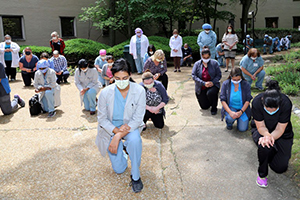By LISA EISENHAUER
June 25, 2020
AMITA Health and three Catholic hospitals in Chicago are among 36 signatories to a statement denouncing "systemic racism" and vowing to help bring the "sweeping change that is needed to ensure health equity across the city and particularly in our most vulnerable neighborhoods."
The first paragraph of the statement references the especially harsh toll that COVID-19 has taken on communities of color and ends with "we say without hesitation that 'Black Lives Matter.'"

Employees of AMITA Health Resurrection Medical Center in Chicago observe nine minutes of silence during a vigil on June 5 to demonstrate their commitment to combat bigotry and racial injustice.
The statement, issued June 19, also references the recent deaths of George Floyd, who was pinned by the neck under the knee of a Minneapolis police officer, and those of other Black Americans that have prompted recent protests nationwide against racism and police brutality.
"Systemic racism is a real threat to the health of our patients, families and communities," the statement says. "We stand with all of those who have raised their voices to capture the attention of Chicago and the nation with a clear call for action."
It goes on to state that racism results in generational trauma and poverty and higher rates of illness and death for its victims. "We have seen — in its rawest form — how the trauma of systemic racism adds to the historical injustices that have disproportionately affected communities of color," the statement says.
In addition to AMITA Health, a member of Ascension, Trinity Health's Mercy Hospital & Medical Center, and Saint Anthony Hospital and St. Bernard Hospital also signed the statement.
Addressing a public health crisis
Pamela Mitchell-Boyd, system director of diversity, inclusion and language services for AMITA Health, says the statement has roots in Chicago Mayor Lori Lightfoot's Racial Equity Rapid Response Team. AMITA is a member of the team established to address health disparities related to Covid-19. "There was a special subcommittee that felt extremely compelled to have all stakeholders make a commitment to eliminating health disparities, particularly as we now understand that race and health disparities are a public health crisis," Mitchell-Boyd says.

Mitchell-Boyd
She is hopeful that the statement will herald continued collaboration among Chicago health care organizations to address health disparities. "This is a call for action," Mitchell-Boyd says. "No organization that was asked to participate in this endeavor said no. We all feel a commitment to work together as a collective to help our most vulnerable populations."
The hospitals, health systems, and community organizations that signed the statement note that they have already taken steps to improve health outcomes for communities of color. Those steps include providing COVID-19 testing, direct care and contact tracing and partnering with the city to provide services and personal protective equipment to marginalized communities; setting up hiring programs that build pipelines for people of color to find careers in health care; and investing in the community to create jobs and help rebuild strained and decimated economies.
Working to rebuild
In addition, the signers of the statement say they are trying to address problems left in the wake of recent protests, such as the closing of businesses due to vandalism and looting. They are partnering with essential pharmacies to help those shops reopen and urging shuttered groceries to resume business.
"Members of our organizations are literally working side-by-side with other volunteers to rebuild following demonstrations across Chicago," the statement says.
The statement's signers also make several commitments to the community. Among those pledges are to re-examine their policies and make changes that promote equity and opportunity; improve access to primary and specialty care; and advocate for increased funding for social needs, social services and programs that promote social justice.
The statement concludes with this: "Our society only truly thrives when everyone has an opportunity to succeed and live a healthy life. We are committed to moving forward together. By harnessing the collective strengths of our organizations, we will help serve our communities as agents of change."